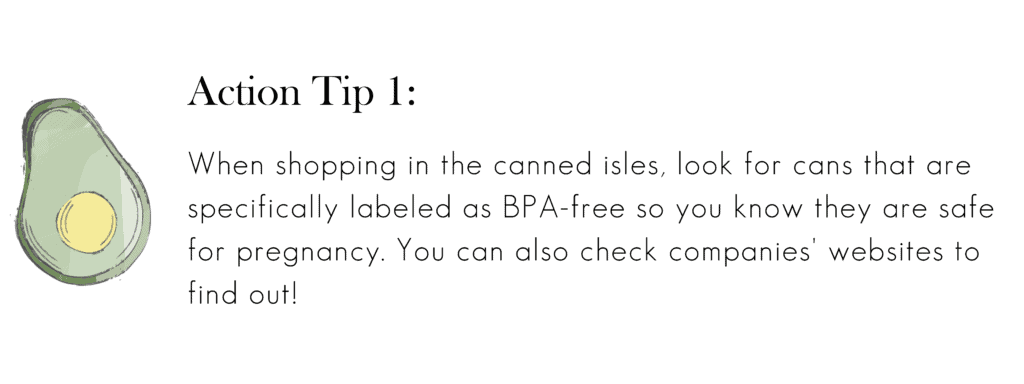Canned foods can be a lifesaver for busy weeknights, for making fewer trips to the store, and meal prepping. They’re conveniently packaged goods with an extended shelf life and can be stored outside the fridge or freezer until opened. This makes canned foods including fruits and vegetables a convenient long-term option to fresh or frozen produce.
Plus, all kinds of food come in a can these days, proteins, veggies, beans, fruit, and more. You can stock up on them and use them when you have limited time to prepare a meal at home! Of course, there are certain considerations when it comes to canned foods which we will discuss below.
Is Canned Food Safe For Pregnancy?
Here’s the deal. Like plastic, most canned food contains an epoxy liner that has the chemical Bisphenol A (BPA) as part of its composition. Unlike food additives, this chemical won’t be found on any ingredient list since it is not intentionally added, but unfortunately, BPA can still seep into the food within the can. Even organic foods (including canned veggies and beans) can still contain BPA unless otherwise specified that they do not.
This chemical is an endocrine disruptor known for causing children’s reproductive, cognitive, and behavioral issues. Some studies show that pregnant women’s consumption of BPA can transfer to the growing fetus and have negative effects on the baby’s future development (1). BPA exposure in-utero has been associated with child obesity, reproductive complications, early puberty in girls, depression and anxiety, diabetes, and heart disease (2, 3).
In studies with mice, BPA has been associated with decreased glucose tolerance, which is often a risk factor for diabetes and is thought to suggest that BPA can increase the risk for metabolic disorders (4).
Studies have also found that higher BPA exposure during pregnancy has been associated with an increased risk of preterm birth, and increased exposure in the third trimester can make women especially vulnerable to preterm birth (5).
In conclusion, we should avoid high levels of BPA, if possible. Unfortunately, this includes the convenient range of canned food available. Unless the can specifies that the product is BPA-free, it won’t be 100% free from this toxin.
What about BPA-free canned food?
The good news is, many companies are now making BPA-free cans, and they typically advertise this right on the label.
However, canned food is still not always the most ideal option to eat every day when pregnant! Buying fresh and frozen will be your safest choice for both you and your growing baby. Still, you can check the labels of different brands of canned food to see if they have BPA-free alternatives.

For example, the below screenshot is from the LaCroix website:

Can canned food have any benefits during pregnancy?
If you are consuming BPA-free canned foods, they can often be an easy source of nutrients. Canned foods are often more affordable than fresh food, are not perishable, and can last in your pantry for months to even years. Canned foods can save time, as they can often be eaten right from the can, or heated in the microwave. Studies have found that people who include canned foods in their diet often have a higher intake of nutrient-dense foods such as fruits and veggies, protein-rich foods, and 17 different essential nutrients (6).
This may be because canned foods offer a variety of these foods readily available, for people who would not otherwise always be able to consume them. If you are someone who benefits from having a pre-cooked, ready-to-go meal or snack option due to time constraints, smell, and food aversions that are worsened by cooking, or simply enjoy the convenience option, BPA-free canned foods can be a viable and nutritious option during pregnancy.
BPA-free canned foods that can be beneficial to include during pregnancy include:
- Canned veggies: mixed veggie blends, green beans, diced tomatoes, green beans
- Canned fish: sardines, salmon, light tuna
- Canned smoked oysters
- Canned white crabmeat
- Canned chicken breast
- Canned roast beef
- Canned beans
These are all viable options for canned foods that can help supplement your diet, but they should never be the main source of nutrients.
Next are some tips on how to decrease the use of canned foods during pregnancy!
Buy fresh or frozen instead of canned.
Fresh food is, of course, a great option, so try to get as many goods, including fruits and vegetables, as fresh as possible. This will ensure your meals are made with the most real food ingredients and minimal preservatives as well.
Frozen is the next best option, and sometimes better than fresh foods since it lasts longer. Frozen produce doesn’t require the same additives and chemicals, like BPA, as canned foods. Nowadays, a lot of food is available frozen and is just as convenient as canned goods!
Choose alternative packaging.
Produce comes in many different packages, not just canned. While this might be the most affordable option, the risks don’t make it the best bang for your buck! The most popular alternative packaging is glass. You can see milk, juices, tomato paste, olives, fruit compote, and many other goods come in this format. Paper goods might not be as available as glass, but it’s a fantastic choice whenever you can find them. Plastic (when free of BPA) is a more widely available option with soups, beans, and even pasta meals ready to buy at the nearest store.
Go shop at the local farmer’s market.
There’s nothing like picking your own food right from those in charge of making it! Farmer’s markets are a fun activity and convenient, allowing you to get the best of both worlds. Enjoy lots of socializing, great prices, local foods, and peace of mind regarding what’s feeding you and your growing baby. You can ask any questions about how the food is grown and avoid canned goods while doing it!
Cook most of your meals at home.
Many people already cook their meals at home during pregnancy to avoid food poisoning or because of other dietary restrictions, however, cooking your meals at home also ensures that canned goods aren’t being thrown into this mix without you actually knowing.
Some restaurants may use canned foods to save money on their end. Cooking at home ensures you are in charge of the whole process from the grocery store to your plate. To further avoid exposure to BPA, buy fresh or frozen produce and put together healthy dishes at home!
Grow your own food at home.
This one might sound a bit overwhelming or time-consuming, especially if you don’t have a green thumb, but growing your own food can be truly rewarding! Not to mention it’s fun, super healthy, seriously fresh, and allows you to avoid canned goods and potential food safety issues.
And, remember, you don’t need to go crazy. It doesn’t have to be the entirety of your pantry and produce stash. You’ll be fine with starting a small fruit and vegetable plot and growing a few seasonal foods, or even just fresh herbs and leafy greens. With time, you’ll gain experience and be able to grow your selection plus maybe a new community.
The Bottom Line
- BPA is a chemical that is found in the liner of most canned foods unless it is labeled as BPA-free. Unlike food additives, this chemical won’t be found on any ingredient list since it is not intentionally added. Even organic canned foods can still contain BPA unless otherwise specified that they do not.
- BPA is best limited during pregnancy, as it can be transferred to the baby and negatively affect future development.
- Canned foods do offer some benefits during pregnancy, such as nutrient-rich foods that are ready to eat. If you have time and/or budget constraints or smell and food aversions, BPA-free canned foods can be a viable and nutritious option during pregnancy
- Alternatives to canned foods include fresh and frozen foods, shopping at a local farmer’s market, cooking meals at home, and growing foods at home.
Written by: Ryann Kipping, MPH, RDN, and Claire Gilmore, MSCN, CNS, LDN


